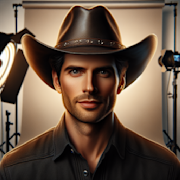Grit and Glory: The Western Genre's Impact on American Cinema

The Western genre has long been a pillar of American cinema, captivating audiences with tales of adventure, perseverance, and the triumph of good over evil. From the early days of silent films to modern blockbusters, Westerns have left an indelible mark on the cultural landscape. In this blog post, we explore the enduring impact of the Western genre on American cinema and its significance in shaping the art form we know today.
Introduction: The Birth of a Genre
The Western genre emerged in the early 20th century, capturing the imaginations of audiences hungry for larger-than-life stories set against the backdrop of the American frontier. In the era of silent films, pioneers such as Edwin S. Porter and D.W. Griffith laid the foundation for Westerns with iconic films like “The Great Train Robbery” (1903) and “The Battle at Elderbush Gulch” (1913).
Section 1: Cultural Reflections
The Western genre struck a chord with American audiences by reflecting the nation’s history, values, and collective identity. The triumph of the rugged individual, the exploration of untamed territories, and the clash between civilization and the wild frontier became defining themes of the genre. As settlers pushed westward in real life, Western films mirrored this expansion, resulting in a deep connection between the mythic West depicted on-screen and the American spirit.
Section 2: Iconic Characters and Archetypes
No discussion of the Western genre would be complete without mentioning its iconic characters and archetypes. From the stoic cowboy with a strong moral code to the fearless lawman standing against injustice, these archetypes have become deeply ingrained in the American psyche. Famed actors such as John Wayne, Clint Eastwood, and Gary Cooper brought these characters to life, enriching the genre with their distinctive portrayals. The emergence of strong and independent female characters, such as Calamity Jane and Annie Oakley, further broadened the genre’s appeal.
Section 3: Evolution and Influence
As American society evolved over the years, so did the Western genre. From the classic Westerns of the mid-20th century to the revisionist Westerns that emerged in the 1960s, the genre saw a shift in tone and themes. Filmmakers like Sergio Leone and Sam Peckinpah challenged traditional notions of heroism, often portraying morally ambiguous characters and exploring darker themes. This evolution allowed the Western genre to remain relevant and adaptable, resonating with new generations of moviegoers.
Section 4: The Western’s Impact on Other Genres
The influence of Westerns extends beyond its own genre. Elements of the Western can be found in various other film genres, from space operas like “Star Wars” to crime dramas like “No Country for Old Men.” The Western’s themes of justice, honor, and resilience have seeped into the fabric of American cinema, shaping narratives and defining storytelling techniques for decades to come.
Section 5: Modern Westerns and Contemporary Cinema
While the popularity of the Western genre may have fluctuated over the years, its impact remains evident in modern Westerns and contemporary cinema. Films like “Unforgiven” (1992) and “True Grit” (2010) not only pay homage to the genre’s traditions but also push boundaries, exploring complex characters and societal issues. The Western continues to be a source of inspiration for filmmakers, adapting to the changing cultural landscape while retaining the grit and glory that define the genre.
Conclusion: The Enduring Legacy
The Western genre’s impact on American cinema cannot be overstated. It has shaped the way we tell stories, influenced other genres, and served as a cultural touchstone for generations. From the early days of silent films to the era of streaming services, the Western continues to captivate audiences, reminding us of the resilience and tenacity that lies at the heart of the American spirit. As long as there are tales of adventure and heroism to be told, the Western genre will remain an integral part of American cinema.

Alberto Miller
Movie Fanatic
More From Classics Authority Movies

Movie
The Ethereal Beauty of Classic Romance Films

Movie
Inside Out (I) (2015)

Movie
A Matter of Life and Death (1946)

Movie
Pinocchio (1940)

Movie
Classic Movies: Where Art and Technology Collide

Movie
Who's Afraid of Virginia Woolf? (1966)





